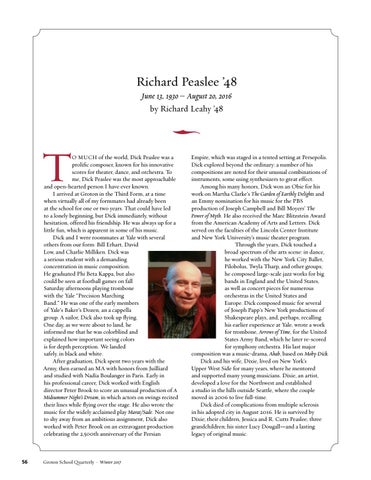Richard Peaslee ’48 June 13, 1930 – August 20, 2016 by Richard Leahy ’48
T
P
O MUCH of the world, Dick Peaslee was a
prolific composer, known for his innovative scores for theater, dance, and orchestra. To me, Dick Peaslee was the most approachable and open-hearted person I have ever known. I arrived at Groton in the Third Form, at a time when virtually all of my formmates had already been at the school for one or two years. That could have led to a lonely beginning, but Dick immediately, without hesitation, offered his friendship. He was always up for a little fun, which is apparent in some of his music. Dick and I were roommates at Yale with several others from our form: Bill Erhart, David Low, and Charlie Milliken. Dick was a serious student with a demanding concentration in music composition. He graduated Phi Beta Kappa, but also could be seen at football games on fall Saturday afternoons playing trombone with the Yale “Precision Marching Band.” He was one of the early members of Yale’s Baker’s Dozen, an a cappella group. A sailor, Dick also took up flying. One day, as we were about to land, he informed me that he was colorblind and explained how important seeing colors is for depth perception. We landed safely, in black and white. After graduation, Dick spent two years with the Army, then earned an MA with honors from Juilliard and studied with Nadia Boulanger in Paris. Early in his professional career, Dick worked with English director Peter Brook to score an unusual production of A Midsummer Night’s Dream, in which actors on swings recited their lines while flying over the stage. He also wrote the music for the widely acclaimed play Marat/Sade. Not one to shy away from an ambitious assignment, Dick also worked with Peter Brook on an extravagant production celebrating the 2,500th anniversary of the Persian
56
Groton School Quarterly
•
Winter 2017
Empire, which was staged in a tented setting at Persepolis. Dick explored beyond the ordinary: a number of his compositions are noted for their unusual combinations of instruments, some using synthesizers to great effect. Among his many honors, Dick won an Obie for his work on Martha Clarke’s The Garden of Earthly Delights and an Emmy nomination for his music for the PBS production of Joseph Campbell and Bill Moyers’ The Power of Myth. He also received the Marc Blitzstein Award from the American Academy of Arts and Letters. Dick served on the faculties of the Lincoln Center Institute and New York University’s music theater program. Through the years, Dick touched a broad spectrum of the arts scene: in dance, he worked with the New York City Ballet, Pilobolus, Twyla Tharp, and other groups; he composed large-scale jazz works for big bands in England and the United States, as well as concert pieces for numerous orchestras in the United States and Europe. Dick composed music for several of Joseph Papp’s New York productions of Shakespeare plays, and, perhaps, recalling his earlier experience at Yale, wrote a work for trombone, Arrows of Time, for the United States Army Band, which he later re-scored for symphony orchestra. His last major composition was a music-drama, Ahab, based on Moby-Dick. Dick and his wife, Dixie, lived on New York’s Upper West Side for many years, where he mentored and supported many young musicians. Dixie, an artist, developed a love for the Northwest and established a studio in the hills outside Seattle, where the couple moved in 2006 to live full-time. Dick died of complications from multiple sclerosis in his adopted city in August 2016. He is survived by Dixie; their children, Jessica and R. Cutts Peaslee; three grandchildren; his sister Lucy Dougall—and a lasting legacy of original music.
